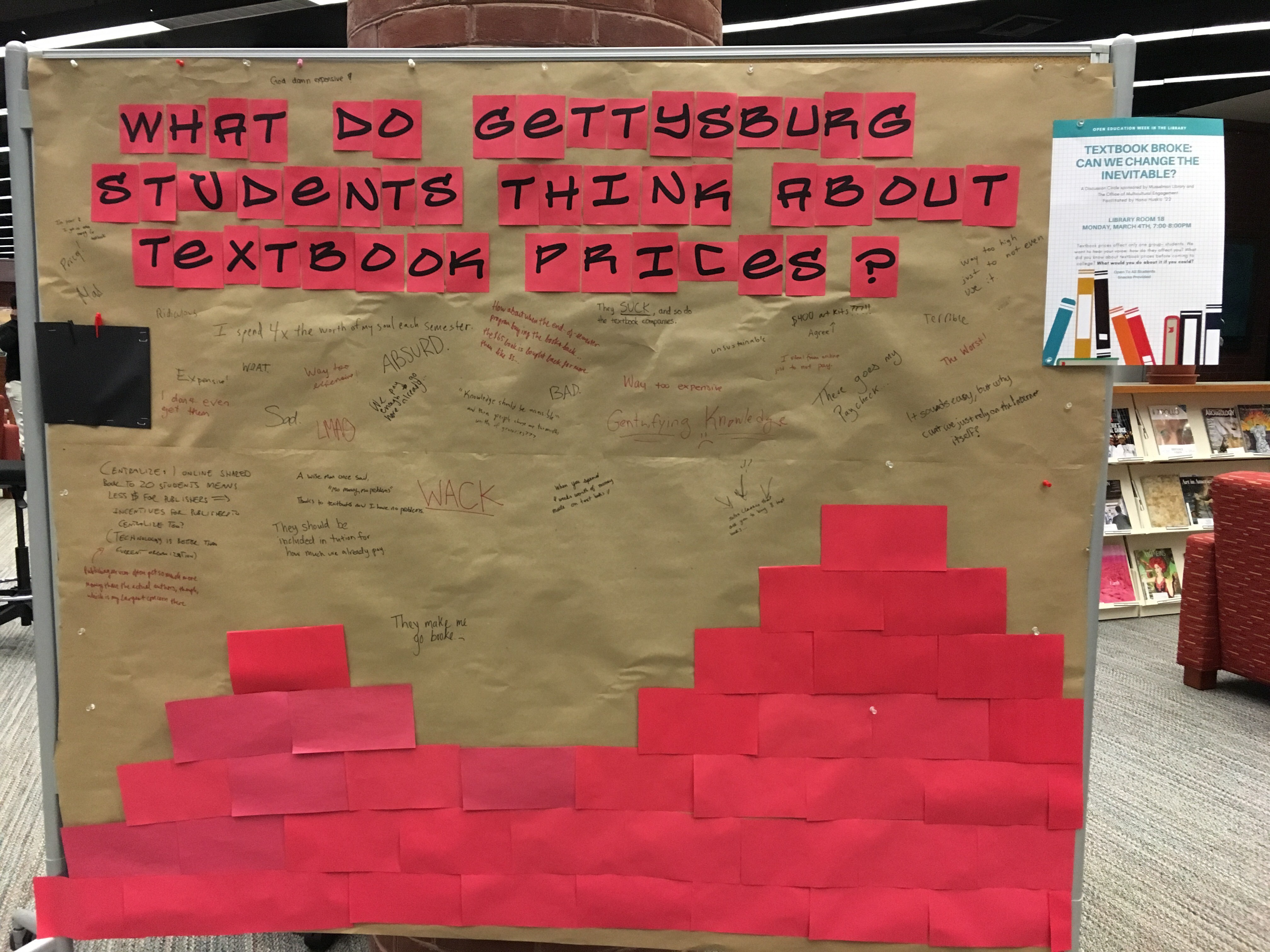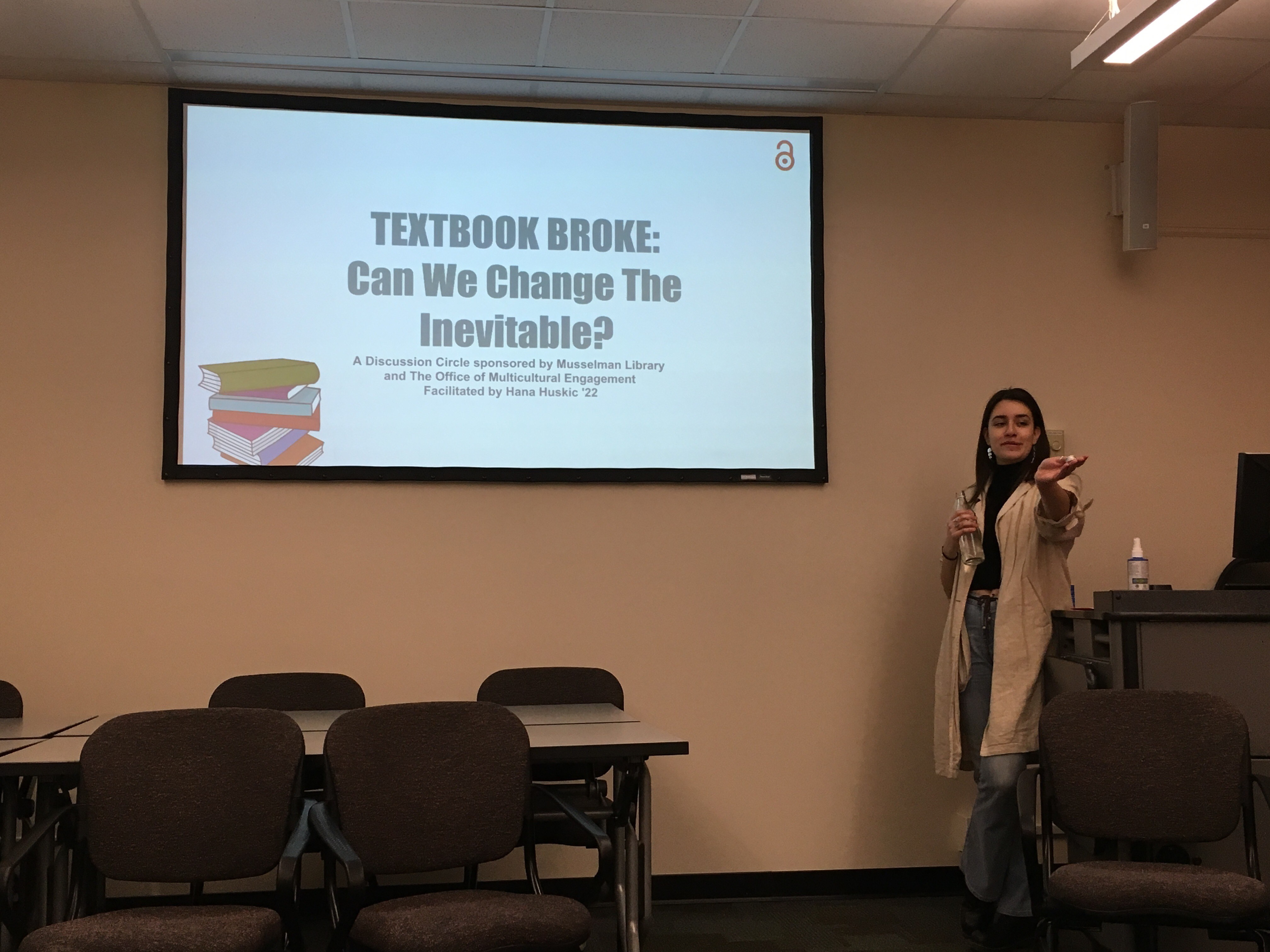
For Musselman Library’s Open Education Week, a discussion board encourages students to share their thoughts on the price of textbooks (Photo Phoebe Doscher/The Gettysburgian)
By Phoebe Doscher, Staff Writer
Hana Huskic ‘22 facilitated a discussion on the prices of textbooks at Gettysburg College on Monday, March 4 in Room 18 of the library as part of Musselman Library’s Open Education Week. This event was titled “#textbookbroke: Can We Change the Inevitable?” Sponsored by Musselman Library and the Office of Multicultural Engagement, Huskic encouraged students to reach out to members of the faculty and voice their concerns on their inability to invest in expensive textbooks year after year.
Huskic, a Scholarly Communications Student Assistant chose to shed light on this issue after hearing fellow students complain about the steep prices of textbooks. She then decided to facilitate this discussion and put an interactive board on the first floor of the library, inviting students to write their thoughts on the prices of textbooks.
Huskic hopes to spark change by encouraging faculty to change to open access textbooks, such as OpenStax or OER Commons, or search for more affordable options for required classroom materials. She hopes students will be brave enough to speak up.
“We go through that tipping point of we’re complaining and we know it’s happening, but librarians and students don’t have that much power,” said Huskic.
During her presentation, Huskic presented the facts about the steadily increasing prices of textbooks as a basis for informed conversation among peers. One of the graphs pointed to a 900% inflation of textbook prices on a Consumer Price Index scale over the past 40 years. Huskic deduced that with very few textbook publishers on the market, prices are easily manipulated, and may earn publishers a profit of around $7-10 billion.
Along with statistics of textbook prices, Huskic supplemented her research with comments on a student’s ability to afford expensive textbooks every semester. She noted that students may fail classes without the textbook, while others end up not using their textbook at all throughout the year.
As an international student herself, she entered Gettysburg with fresh eyes on the issue and took a personal stance on the ability to afford textbooks in addition to the tuition at this small liberal arts school: “We didn’t talk about social justice 20 years ago. Textbooks weren’t a question. Gettysburg has increased diversity and 16% of students are recipients of fellow grants and the majority of international students are on full scholarships.”

Hana Huskic ’22 led a presentation and discussion on the prices of college textbooks on Monday (Photo Phoebe Doscher/The Gettysburgian)
Following her presentation, Huskic welcomed discussion on the topic. She prompted students to discuss what first comes to mind when they think of textbooks and their initial expectations about prices before coming to school. Students present came to a resounding agreement that college textbooks connote spending money and that we have all chosen to accept the destiny of investing in books required to enhance our education.
Ana Vashakmadze ‘22, an international student, mentioned differences between her home country of Georgia and the United States, including the increased price of textbooks after converting currency to American dollars.
Students have fenegled the system of searching for cheaper books, and they may resort to buying their resources off of Amazon or other online booksellers if the options from the bookstore are unavailable or too expensive. If students prompt conversations about their inability to or difficulty purchasing books for certain courses with faculty members, Huskic thinks there may be a shift in the amount spent on classroom materials.
Musselman Library will have a board on display on the first floor for the rest of the week for students to share their comments among peers. Huskic and her coworkers are planning to send a survey out to the student body on the topic of textbook prices to supplement their conversation with statistics from the Gettysburg community.
Huskic hopes that students will become inspired to take matters into their own hands and vouch for potentially lowering textbook prices or encouraging faculty to alter class resources. While students may think they do not have the authority to speak up, Huskic reminds students, “We’re not just here to sit and learn. We’re here for practical learning and to be put in uncomfortable positions. This is an uncomfortable position to challenge decisions. We’re pretty powerful here — it’s not like we can’t do anything!”
